牛津译林版七年级英语下Unit2 Neighbours Welcome to the unit课件
文档属性
| 名称 | 牛津译林版七年级英语下Unit2 Neighbours Welcome to the unit课件 |
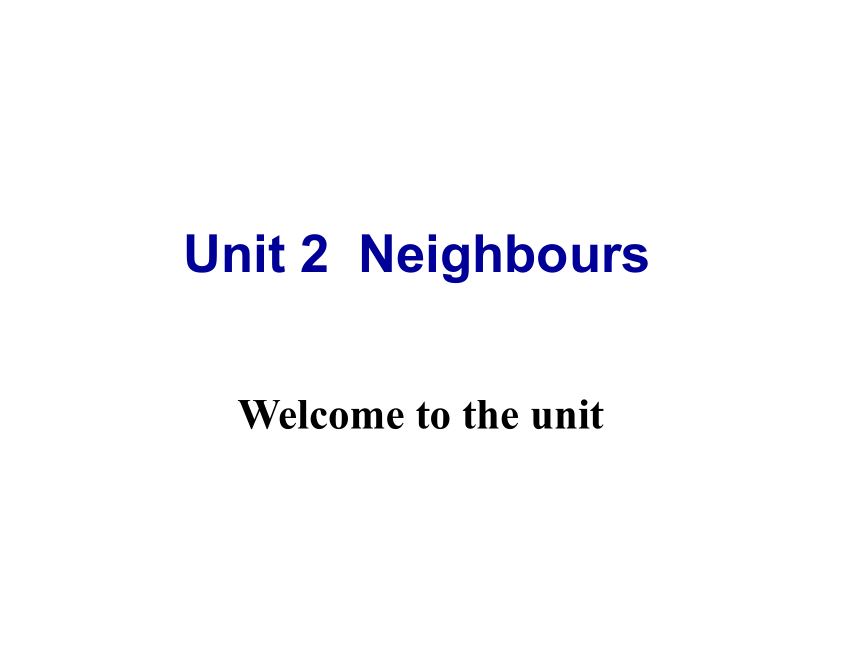
|
|
| 格式 | zip | ||
| 文件大小 | 536.0KB | ||
| 资源类型 | 教案 | ||
| 版本资源 | 牛津译林版 | ||
| 科目 | 英语 | ||
| 更新时间 | 2016-03-15 00:00:00 | ||
图片预览


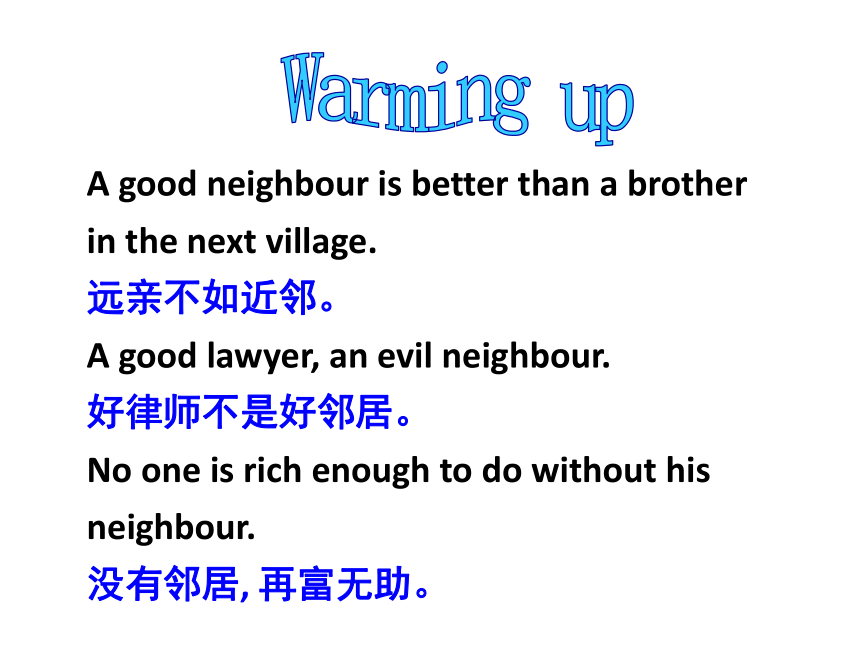
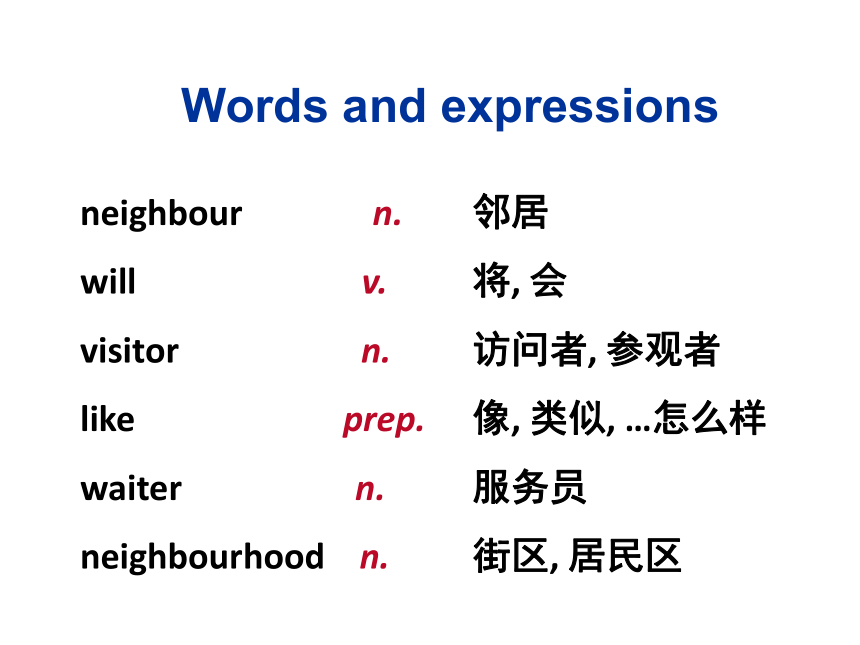
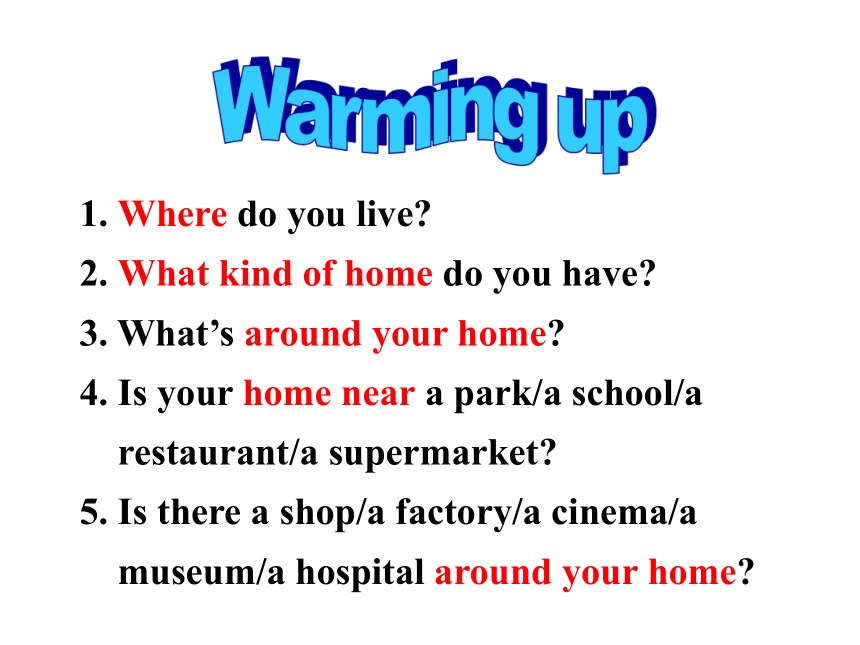
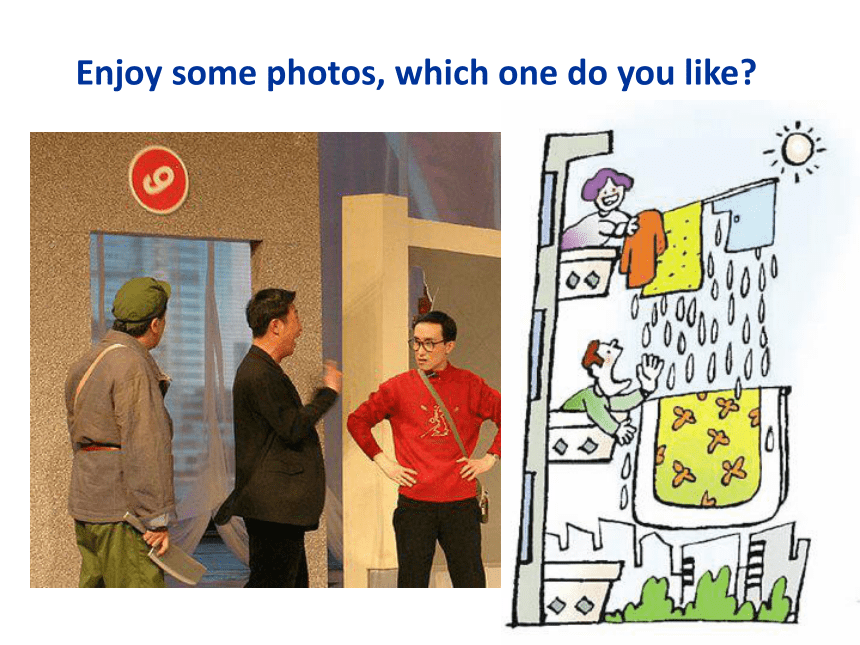
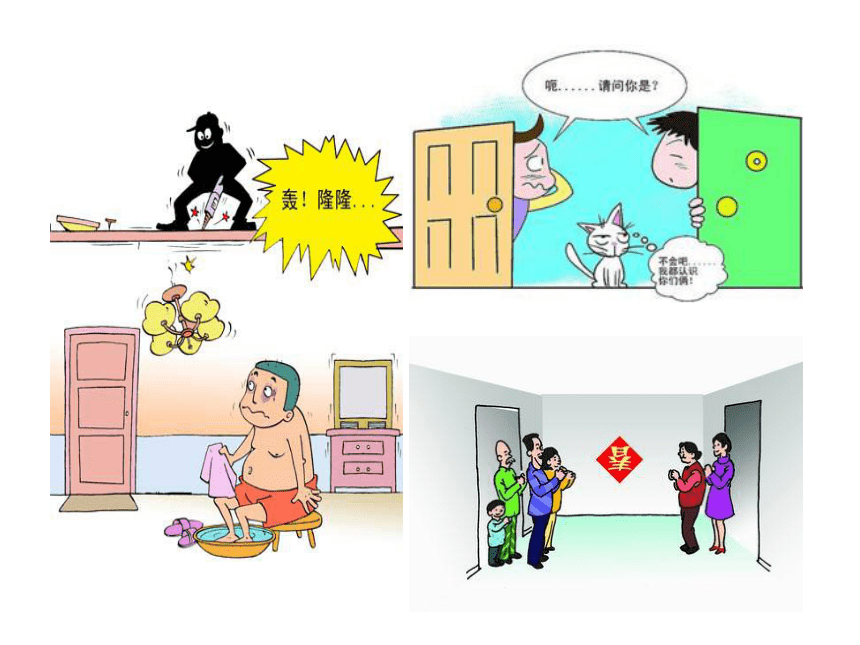


文档简介
课件22张PPT。Unit 2 Neighbours Welcome to the unit1. 能识别并掌握各种职业及工作场所的名称。
2. 能用简单的英语谈论自己所居住的社区。Comic strip and welcome to the unit学习目标学习内容四会内容
词汇: neighbour will visitor like
词组: live in, how many, most of
句型: I’m going to visit our new neighbours.A good neighbour is better than a brother
in the next village.
A good lawyer, an evil neighbour.
No one is rich enough to do without his
neighbour.Warming up远亲不如近邻。
好律师不是好邻居。
没有邻居, 再富无助。Words and expressionsneighbour n.
will v.
visitor n.
like prep.
waiter n.
neighbourhood n.邻居
将, 会
访问者, 参观者
像, 类似, …怎么样
服务员
街区, 居民区1. Where do you live?
2. What kind of home do you have?
3. What’s around your home?
4. Is your home near a park/a school/a
restaurant/a supermarket?
5. Is there a shop/a factory/a cinema/a
museum/a hospital around your home?Warming upEnjoy some photos, which one do you like?Watch and Learn.备注:见视频 Unit 2-Comic StripListen again and answer.1. What is Hobo going to do ?
2. Does Eddie want to meet new neighbours?
3. Why don’t neighbours welcome Eddie in
Hobo’s opinion?He is going to visit new neighbours.Yes, he does.Because Eddie likes eating too much.People and placesWhere can you find these people? Match them with the places. Write the correct letters in the boxes.Acbabac Amy: Where do you live, Simon?
Simon: I live in a flat in City Garden in Ninth
Street.
Amy: How many buildings are there in your
neighbourhood?Amy is asking Simon about his neighbourhood. Work in pairs and talk about your neighbourhood. Use the conversation below as a model. B Simon: There are about 20 buildings. Most
of them have 14 floors.
Amy: What do you have around your
neighbourhood?
Simon: We have supermarkets, restaurants,
a school and a hospital.
Amy: Do you like living there?
Simon: Yes. It’s good to live in a
neighbourhood like that.Language Points1. I’m going to visit our new neighbours.
I’ll meet them, too.
be going to do sth. 和 will do sth. 都是一般
将来时态的动词结构。前者的be动词需要
依据句子主语的人称或单复数来确定am,
is或are, 而后者的will则不需要变化。
e.g. Students are going to go for a school trip
next Sunday.
It will rain tomorrow.2. I’m afraid they won’t welcome visitors like
you. 我恐怕他们不欢迎像你这样的客人吧。
1) be afraid to do sth./
be afraid of (doing) sth. /
be afraid (that) +句子 “害怕……”
afraid 在这里作表语, 它有“害怕, 担心……,
恐怕……”等意思。?
e.g. I am afraid of snakes. He is afraid of going out at night.
I’m afraid that I can’t help you. ?
Don’t be afraid.2) won’t welcome
此处的won’t = will not, 是其缩写形式。
<拓展>
一般将来时态的否定形式的动词结构:
am/is/are not going to do sth.
e.g. I am not going to go to Beijing next week.
下周我不去北京了。
will not do sth. = won’t do sth.
e.g. You won’t be much better.
你已经非常好了。3. I live in a flat in City Garden in Ninth
Street.
live in 表示“住在……的地方;住在(某
地); 存在于…”。
e.g. My?grandparents?live?in?shanghai.
我的祖父母居住在上海。
in the street (BE) = on the street (AM)4. How many buildings are there in your neighbourhood?
how many + 可数名词复数
how much + 不可数名词,二者都是对数量的询问。
e.g.: How many apples on the table?
桌子上有多少苹果?
How much milk in the bottle?
瓶子里有多少牛奶?一、翻译下列短语。
拜访新邻居
_______________________
2. 住在城市花园的一个公寓里___________________________
3. 他们中的大多数
________________________
4. 在你的居民区周围___________________________Exercisesvisit new neighbourslive in a flat in City Gardenmost of themaround your neighbourhood二、单选题。I don’t know how to _____the restaurant.
A. get to B. get
C. gets D. getting
2. I think it’s difficult for him _______ English well.
A. studies B. studying
C. to study D. study
3. There is a big tree ________ our classroom.
A. in front B. in front of
C. in the front D. in the front of ACB4. Where ______ does Millie want to visit?
A. else B. other
C. others D. another
5. They will arrive _______ Beijing _______
April 20th.
A. in; in B. at; at
C. in; on D. at; onAC
2. 能用简单的英语谈论自己所居住的社区。Comic strip and welcome to the unit学习目标学习内容四会内容
词汇: neighbour will visitor like
词组: live in, how many, most of
句型: I’m going to visit our new neighbours.A good neighbour is better than a brother
in the next village.
A good lawyer, an evil neighbour.
No one is rich enough to do without his
neighbour.Warming up远亲不如近邻。
好律师不是好邻居。
没有邻居, 再富无助。Words and expressionsneighbour n.
will v.
visitor n.
like prep.
waiter n.
neighbourhood n.邻居
将, 会
访问者, 参观者
像, 类似, …怎么样
服务员
街区, 居民区1. Where do you live?
2. What kind of home do you have?
3. What’s around your home?
4. Is your home near a park/a school/a
restaurant/a supermarket?
5. Is there a shop/a factory/a cinema/a
museum/a hospital around your home?Warming upEnjoy some photos, which one do you like?Watch and Learn.备注:见视频 Unit 2-Comic StripListen again and answer.1. What is Hobo going to do ?
2. Does Eddie want to meet new neighbours?
3. Why don’t neighbours welcome Eddie in
Hobo’s opinion?He is going to visit new neighbours.Yes, he does.Because Eddie likes eating too much.People and placesWhere can you find these people? Match them with the places. Write the correct letters in the boxes.Acbabac Amy: Where do you live, Simon?
Simon: I live in a flat in City Garden in Ninth
Street.
Amy: How many buildings are there in your
neighbourhood?Amy is asking Simon about his neighbourhood. Work in pairs and talk about your neighbourhood. Use the conversation below as a model. B Simon: There are about 20 buildings. Most
of them have 14 floors.
Amy: What do you have around your
neighbourhood?
Simon: We have supermarkets, restaurants,
a school and a hospital.
Amy: Do you like living there?
Simon: Yes. It’s good to live in a
neighbourhood like that.Language Points1. I’m going to visit our new neighbours.
I’ll meet them, too.
be going to do sth. 和 will do sth. 都是一般
将来时态的动词结构。前者的be动词需要
依据句子主语的人称或单复数来确定am,
is或are, 而后者的will则不需要变化。
e.g. Students are going to go for a school trip
next Sunday.
It will rain tomorrow.2. I’m afraid they won’t welcome visitors like
you. 我恐怕他们不欢迎像你这样的客人吧。
1) be afraid to do sth./
be afraid of (doing) sth. /
be afraid (that) +句子 “害怕……”
afraid 在这里作表语, 它有“害怕, 担心……,
恐怕……”等意思。?
e.g. I am afraid of snakes. He is afraid of going out at night.
I’m afraid that I can’t help you. ?
Don’t be afraid.2) won’t welcome
此处的won’t = will not, 是其缩写形式。
<拓展>
一般将来时态的否定形式的动词结构:
am/is/are not going to do sth.
e.g. I am not going to go to Beijing next week.
下周我不去北京了。
will not do sth. = won’t do sth.
e.g. You won’t be much better.
你已经非常好了。3. I live in a flat in City Garden in Ninth
Street.
live in 表示“住在……的地方;住在(某
地); 存在于…”。
e.g. My?grandparents?live?in?shanghai.
我的祖父母居住在上海。
in the street (BE) = on the street (AM)4. How many buildings are there in your neighbourhood?
how many + 可数名词复数
how much + 不可数名词,二者都是对数量的询问。
e.g.: How many apples on the table?
桌子上有多少苹果?
How much milk in the bottle?
瓶子里有多少牛奶?一、翻译下列短语。
拜访新邻居
_______________________
2. 住在城市花园的一个公寓里___________________________
3. 他们中的大多数
________________________
4. 在你的居民区周围___________________________Exercisesvisit new neighbourslive in a flat in City Gardenmost of themaround your neighbourhood二、单选题。I don’t know how to _____the restaurant.
A. get to B. get
C. gets D. getting
2. I think it’s difficult for him _______ English well.
A. studies B. studying
C. to study D. study
3. There is a big tree ________ our classroom.
A. in front B. in front of
C. in the front D. in the front of ACB4. Where ______ does Millie want to visit?
A. else B. other
C. others D. another
5. They will arrive _______ Beijing _______
April 20th.
A. in; in B. at; at
C. in; on D. at; onAC
